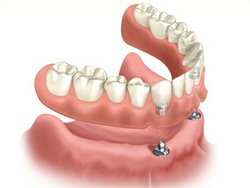What Are The Problems And Risks Of Dental Implants?
Reviewed June 2024 by Our Content Experts
Dental implants are a great way to replace missing or badly diseased teeth and restore your smile. They're a natural looking, long term alternative to traditional dentures, giving you a beautiful, full smile without having to worry if people can notice them.
If you're missing teeth, dental implants will help restore your confidence. Whether you're missing one tooth or several, dental implants are usually a great solution. They're designed as an artificial replacement for tooth roots, attached to the jawbone and gum tissue like a screw. This creates an anchor for the replacement teeth, like dental crowns and bridges.
However, as with any procedure, dental implant treatment comes with some potential challenges and risks. Some of the more common problems include infection, injury to other teeth or blood vessels, sinus problems, and nerve damage. While dental implants are generally a safe procedure, you should speak with a Smile dentist for professional advice tailored to your needs. Your Smile dentist will also ensure that you have detailed information on side effects and potential issues before your treatment. If you're experiencing pain or discomfort for more than a week after your surgery, see your Smile dentist to ensure that everything is healing properly.

What causes dental implants infection?
Infection is usually caused by bacteria in the mouth getting under the gum during the treatment. This generally occurs when a diseased tooth is removed for the implant to be inserted and bacteria from the damaged tooth is left behind. It can also occur if the implant isn't placed properly, leaving a gap between the implant and the bone, allowing bacteria to enter.
What sort of infection can occur after dental implants?
Most of the time, dental implant infection occurs in the gums. They can appear red and swollen, and sometimes bleed or leak pus. Other infections, although rare, can occur in the jawbone, which can lead to bone loss.
Dental implant infections in the gums aren't unusual, but they are generally minor and don't last long. More often than not, an infection in the gums can be treated with a short course of antibiotics.
An infection to the bone is a little trickier to treat. You will usually need to take strong antibiotics and have the implant removed in order to heal. In severe cases of bone infection following dental implant treatment, part of the jawbone will wear away or die and will have to be removed.
Can dental implants cause teeth or blood vessels damage?
Surrounding teeth and blood vessels can be damaged during dental implant treatment. Your Smile dentist will be able to determine any potential issues with x-rays and a thorough examination of your teeth before the procedure to try and avoid these problems.
How does such injury/damage occur?
It's possible for the dentist to damage the root of a nearby tooth while drilling into the jawbone to insert the implant. This leads to a damaged tooth and blood vessels. This is rare but if you have any concerns about this risk, you can talk to your Smile dentist for professional advice and reassurance.
Treatment for a damaged tooth or blood vessels may require a filling or cap to close the hole in the tooth and protect the pulp. If the pulp has been damaged, a root canal may be required to avoid infection and further damage.

Can dental implants cause nerve damage?
Nerve damage can occur during dental implant treatment to the lower jaw. This can happen when an implant is placed too close to the main nerve running through the jawline. Symptoms of nerve damage might be pain, numbness and tingling in the gums, cheek, lips or tongue.
How does nerve damage occur?
The main nerve that runs through the lower jawline, the inferior alveolar, is very sensitive. If your dentist hits it during your procedure, or your dental implant is screwed in too close to the nerve, it can lead to damage. Your Smile dentist can locate the nerve and avoid close contact through careful planning prior to your treatment.
In most cases, nerve damage during dental implant treatment is rare and minor. In order to treat and repair the nerve, the dentist will remove the dental implant. This allows the nerve fibres to reconnect and usually repair themselves within a few weeks, under evaluation by your dentist. In the meantime, your dentist will most likely prescribe you medication to help with any pain.
Can dental implants cause sinus problems?
Damage to the sinuses can occur during dental implant treatment to the upper jaw. The bones in our faces are hollow and the spaces inside them are called sinuses. If the dentist doesn't have enough bone to insert the dental implant, the bone can be perforated. If a bone is perforated, this can cause damage to the sinus and pose the risk of a sinus infection.
How does a sinus problem occur?
Sinus perforation is rare and mostly occurs when having dental implant treatment in the upper jaw. Damage can happen when the bones in the face are perforated by tools or the dental implant, creating the risk of a sinus infection. In most cases, the dental implant will be removed and the bone repaired before getting a new dental implant put in.

How to reduce the risks of dental implants?
While the risks associated with dental implants are rare, it's important to take the right steps to reduce the likelihood of developing an infection or experiencing these complications.
How to Reduce Risks Before the Procedure
- Consult with your Smile dentist before treatment. A good dental surgeon will thoroughly examine your mouth and take x-rays and CT scans to identify any possible problems and to plan your treatment appropriately.
- Smoking limits bone growth and reduces the dental implant success rates. If you're a smoker, try to quit prior to your operation to give yourself a better chance to heal.
- Maintain good oral health. Make sure you're brushing at least twice a day and flossing daily prior to your treatment to ensure your mouth is home to as little bacteria as possible.
How to Reduce Risks After the Procedure
- Don't touch the treatment site. While it may be tempting to run your tongue over your new implant, disturbing the area can lead to irritation and infection.
- Follow your dentist's instructions. If you have been prescribed antibiotics as a preventative of infection, finish the entire course.
- Maintain good oral health. A healthy oral care routine will reduce build up of plaque and bacteria, further helping to prevent an infection. You will likely be required to use mouthwash several time a day for the first week following your procedure. Warm salt rinses are also a great way to encourage healing.
- Follow up with your dentist. It's important to visit your dentist to monitor the progress of your healing. It's especially important to remember that any pain or swelling should subside after a few days, and if it doesn't, you should visit your dentist immediately.
You can learn more about dental implants on our website. For the top-rated dental cover in Australia, join Smile from just $79 a year and choose a Smile dentist. Join online in 2 minutes by clicking Join Now & Benefit Instantly.

